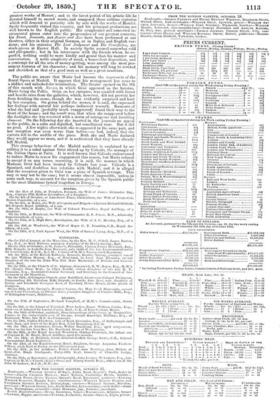The public are aware that Mario had become the impresario
of the Royal Opera at Madrid. It appears that his management has come to a sudden and unlooked-for termination. The theatre opened on the 6th of this month with Norma, in which Grisi appeared as the heroine, Mario being the Pollio. Grisi, on her entrance, was assailed with hisses and hostile cries from the galleries, which, however, did not prevent her from finishing the scene, though she was evidently surprised and hurt by her reception. On going behind the scenes, it is said, she expressed her feelings with natural but perhaps indiscreet warmth. Rumours of what she had said (probably much exaggerated) found their way to the front of the house; and the result was, that when she reappeared before the footlights she was received with a storm of outrageous and insulting clamour. On the following day she inserted in the journals an appeal to the public, in a calm and dignified, but conciliatory tone. But it did no good. A few nights afterwards she re-appeared in the same part, and her reception was even worse than before—so bad, indeed, that the curtain fell in the middle of the piece. Both she and Mario declared they would appear no more, and it is understood that they have already left Madrid.
This strange behaviour of the Madrid audience is explained by as- cribing it to a cabal against Grisi stirred up by Calzado, the manager of the Italian Opera at Paris. It is well known that Calzado endeavoured to induce Mario to renew his engagement this season, but Mario refused to accept it on any terms, resenting, it is said, the manner in which Madame Grisi had been treated by Calzado last year. Calzado is a Spaniard, and doubtless has relations with Madrid; and it is alleged that the reception given to Grisi was a piece of Spanish revenge. This may or may not be the ease; but it seems almost impossible, unless in some such way, to account for the reception given by the Spanish public to the most illustrious lyrical tragedian in Europe.


























 Previous page
Previous page